- Home
- Herman Melville
Mardi and a Voyage Thither Page 2
Mardi and a Voyage Thither Read online
Page 2
And thus much being said, all has been related that I then knew of the islands in question. Enough, however, that they existed at all; and that our path thereto lay over a pleasant sea, and before a reliable Trade-wind. The distance, though great, was merely an extension of water; so much blankness to be sailed over; and in a craft, too, that properly managed has been known to outlive great ships in a gale. For this much is true of a whale-boat, the cunningest thing in its way ever fabricated by man.
Upon one of the Kingsmill islands, then, I determined to plant my foot, come what come would. And I was equally determined that one of the ship's boats should float me thither. But I had no idea of being without a companion. It would be a weary watch to keep all by myself, with naught but the horizon in sight.
Now, among the crew was a fine old seaman, one Jarl; how old, no one could tell, not even himself. Forecastle chronology is ever vague and defective. "Man and boy," said honest Jarl, "I have lived ever since I can remember." And truly, who may call to mind when he was not? To ourselves, we all seem coeval with creation. Whence it comes, that it is so hard to die, ere the world itself is departed.
Jarl hailed from the isle of Skye, one of the constellated Hebrides.
Hence, they often called him the Skyeman. And though he was far from being piratical of soul, he was yet an old Norseman to behold. His hands were brawny as the paws of a bear; his voice hoarse as a storm roaring round the old peak of Mull; and his long yellow hair waved round his head like a sunset. My life for it, Jarl, thy ancestors were Vikings, who many a time sailed over the salt German sea and the Baltic; who wedded their Brynhildas in Jutland; and are now quaffing mead in the halls of Valhalla, and beating time with their cans to the hymns of the Scalds. Ah! how the old Sagas run through me!
Yet Jarl, the descendant of heroes and kings, was a lone, friendless mariner on the main, only true to his origin in the sea-life that he led. But so it has been, and forever will be. What yeoman shall swear that he is not descended from Alfred? what dunce, that he is not sprung of old Homer? King Noah, God bless him! fathered us all. Then hold up your heads, oh ye Helots, blood potential flows through your veins. All of us have monarchs and sages for kinsmen; nay, angels and archangels for cousins; since in antediluvian days, the sons of God did verily wed with our mothers, the irresistible daughters of Eve.
Thus all generations are blended: and heaven and earth of one kin: the hierarchies of seraphs in the uttermost skies; the thrones and principalities in the zodiac; the shades that roam throughout space; the nations and families, flocks and folds of the earth; one and all, brothers in essence-oh, be we then brothers indeed! All things form but one whole; the universe a Judea, and God Jehovah its head. Then no more let us start with affright. In a theocracy, what is to fear? Let us compose ourselves to death as fagged horsemen sleep in the saddle. Let us welcome even ghosts when they rise. Away with our stares and grimaces. The New Zealander's tattooing is not a prodigy; nor the Chinaman's ways an enigma. No custom is strange; no creed is absurd; no foe, but who will in the end prove a friend. In heaven, at last, our good, old, white-haired father Adam will greet all alike, and sociality forever prevail. Christian shall join hands between Gentile and Jew; grim Dante forget his Infernos, and shake sides with fat Rabelais; and monk Luther, over a flagon of old nectar, talk over old times with Pope Leo. Then, shall we sit by the sages, who of yore gave laws to the Medes and Persians in the sun; by the cavalry captains in Perseus, who cried, "To horse!" when waked by their Last Trump sounding to the charge; by the old hunters, who eternities ago, hunted the moose in Orion; by the minstrels, who sang in the Milky Way when Jesus our Saviour was born. Then shall we list to no shallow gossip of Magellans and Drakes; but give ear to the voyagers who have circumnavigated the Ecliptic; who rounded the Polar Star as Cape Horn. Then shall the Stagirite and Kant be forgotten, and another folio than theirs be turned over for wisdom; even the folio now spread with horoscopes as yet undeciphered, the heaven of heavens on high.
Now, in old Jarl's lingo there was never an idiom. Your aboriginal tar is too much of a cosmopolitan for that. Long companionship with seamen of all tribes: Manilla-men, Anglo-Saxons, Cholos, Lascars, and Danes, wear away in good time all mother-tongue stammerings. You sink your clan; down goes your nation; you speak a world's language, jovially jabbering in the Lingua-Franca of the forecastle.
True to his calling, the Skyeman was very illiterate; witless of Salamanca, Heidelberg, or Brazen-Nose; in Delhi, had never turned over the books of the Brahmins. For geography, in which sailors should be adepts, since they are forever turning over and over the great globe of globes, poor Jarl was deplorably lacking. According to his view of the matter, this terraqueous world had been formed in the manner of a tart; the land being a mere marginal crust, within which rolled the watery world proper. Such seemed my good Viking's theory of cosmography. As for other worlds, he weened not of them; yet full as much as Chrysostom.
Ah, Jarl! an honest, earnest Wight; so true and simple, that the secret operations of thy soul were more inscrutable than the subtle workings of Spinoza's.
Thus much be said of the Skyeman; for he was exceedingly taciturn, and but seldom will speak for himself.
Now, higher sympathies apart, for Jarl I had a wonderful liking; for he loved me; from the first had cleaved to me.
It is sometimes the case, that an old mariner like him will conceive a very strong attachment for some young sailor, his shipmate; an attachment so devoted, as to be wholly inexplicable, unless originating in that heart-loneliness which overtakes most seamen as they grow aged; impelling them to fasten upon some chance object of regard. But however it was, my Viking, thy unbidden affection was the noblest homage ever paid me. And frankly, I am more inclined to think well of myself, as in some way deserving thy devotion, than from the rounded compliments of more cultivated minds.
Now, at sea, and in the fellowship of sailors, all men appear as they are. No school like a ship for studying human nature. The contact of one man with another is too near and constant to favor deceit. You wear your character as loosely as your flowing trowsers. Vain all endeavors to assume qualities not yours; or to conceal those you possess. Incognitos, however desirable, are out of the question. And thus aboard of all ships in which I have sailed, I have invariably been known by a sort of thawing-room title. Not, — let me hurry to say, — that I put hand in tar bucket with a squeamish air, or ascended the rigging with a Chesterfieldian mince. No, no, I was never better than my vocation; and mine have been many. I showed as brown a chest, and as hard a hand, as the tarriest tar of them all. And never did shipmate of mine upbraid me with a genteel disinclination to duty, though it carried me to truck of main-mast, or jib-boom-end, in the most wolfish blast that ever howled.
Whence then, this annoying appellation? for annoying it most assuredly was. It was because of something in me that could not be hidden; stealing out in an occasional polysyllable; an otherwise incomprehensible deliberation in dining; remote, unguarded allusions to Belles-Lettres affairs; and other trifles superfluous to mention.
But suffice it to say, that it had gone abroad among the Areturion's crew, that at some indefinite period of my career, I had been a "nob." But Jarl seemed to go further. He must have taken me for one of the House of Hanover in disguise; or, haply, for bonneted Charles Edward the Pretender, who, like the Wandering Jew, may yet be a vagrant. At any rate, his loyalty was extreme. Unsolicited, he was my laundress and tailor; a most expert one, too; and when at meal-times my turn came round to look out at the mast-head, or stand at the wheel, he catered for me among the «kids» in the forecastle with unwearied assiduity. Many's the good lump of «duff» for which I was indebted to my good Viking's good care of me. And like Sesostris I was served by a monarch. Yet in some degree the obligation was mutual. For be it known that, in sea-parlance, we were chummies. Now this chummying among sailors is like the brotherhood subsisting between a brace of collegians (chums) rooming together. It is a Fidus-Achates-ship, a leag
ue of offense and defense, a copartnership of chests and toilets, a bond of love and good feeling, and a mutual championship of the absent one. True, my nautical reminiscenses remind me of sundry lazy, ne'er-do-well, unprofitable, and abominable chummies; chummies, who at meal times were last at the "kids," when their unfortunate partners were high upon the spars; chummies, who affected awkwardness at the needle, and conscientious scruples about dabbling in the suds; so that chummy the simple was made to do all the work of the firm, while chummy the cunning played the sleeping partner in his hammock. Out upon such chummies!
But I appeal to thee, honest Jarl, if I was ever chummy the cunning.
Never mind if thou didst fabricate my tarpaulins; and with Samaritan charity bind up the rents, and pour needle and thread into the frightful gashes that agonized my hapless nether integuments, which thou calledst "ducks;"-Didst thou not expressly declare, that all these things, and more, thou wouldst do for me, despite my own quaint thimble, fashioned from the ivory tusk of a whale? Nay; could I even wrest from thy willful hands my very shirt, when once thou hadst it steaming in an unsavory pickle in thy capacious vat, a decapitated cask? Full well thou knowest, Jarl, that these things are true; and I am bound to say it, to disclaim any lurking desire to reap advantage from thy great good nature.
Now my Viking for me, thought I, when I cast about for a comrade; and my Viking alone.
CHAPTER IV
A Chat In The Clouds
The Skyeman seemed so earnest and upright a seaman, that to tell the plain truth, in spite of his love for me, I had many misgivings as to his readiness to unite in an undertaking which apparently savored of a moral dereliction. But all things considered, I deemed my own resolution quite venial; and as for inducing another to join me, it seemed a precaution so indispensable, as to outweigh all other considerations.
Therefore I resolved freely to open my heart to him; for that special purpose paying him a visit, when, like some old albatross in the air, he happened to be perched at the foremast-head, all by himself, on the lookout for whales never seen.
Now this standing upon a bit of stick 100 feet aloft for hours at a time, swiftly sailing over the sea, is very much like crossing the Channel in a balloon. Manfred-like, you talk to the clouds: you have a fellow feeling for the sun. And when Jarl and I got conversing up there, smoking our dwarfish "dudeens," any sea-gull passing by might have taken us for Messrs. Blanchard and Jeffries, socially puffing their after-dinner Bagdads, bound to Calais, via Heaven, from Dover.
Honest Jarl, I acquainted with all: my conversation with the captain, the hint implied in his last words, my firm resolve to quit the ship in one of her boats, and the facility with which I thought the thing could be done. Then I threw out many inducements, in the shape of pleasant anticipations of bearing right down before the wind upon the sunny isles under our lee.
He listened attentively; but so long remained silent that I almost fancied there was something in Jarl which would prove too much for me and my eloquence.
At last he very bluntly declared that the scheme was a crazy one; he had never known of such a thing but thrice before; and in every case the runaways had never afterwards been heard of. He entreated me to renounce my determination, not be a boy, pause and reflect, stick to the ship, and go home in her like a man. Verily, my Viking talked to me like my uncle.
But to all this I turned a deaf ear; affirming that my mind was made up; and that as he refused to accompany me, and I fancied no one else for a comrade, I would go stark alone rather than not at all. Upon this, seeing my resolution immovable, he bluntly swore that he would follow me through thick and thin.
Thanks, Jarl! thou wert one of those devoted fellows who will wrestle hard to convince one loved of error; but failing, forthwith change their wrestling to a sympathetic hug.
But now his elderly prudence came into play. Casting his eye over the boundless expanse below, he inquired how far off were the islands in question.
"A thousand miles and no less."
"With a fair trade breeze, then, and a boat sail, that is a good twelve days' passage, but calms and currents may make it a month, perhaps more." So saying, he shook his old head, and his yellow hair streamed.
But trying my best to chase away these misgivings, he at last gave them over. He assured me I might count upon him to his uttermost keel.
My Viking secured, I felt more at ease; and thoughtfully considered how the enterprise might best be accomplished.
There was no time to be lost. Every hour was carrying us farther and farther from the parallel most desirable for us to follow in our route to the westward. So, with all possible dispatch, I matured my plans, and communicated them to Jarl, who gave several old hints-having ulterior probabilities in view-which were not neglected.
Strange to relate, it was not till my Viking, with a rueful face, reminded me of the fact, that I bethought me of a circumstance somewhat alarming at the first blush. We must push off without chart or quadrant; though, as will shortly be seen, a compass was by no means out of the question. The chart, to be sure, I did not so much lay to heart; but a quadrant was more than desirable. Still, it was by no means indispensable. For this reason. When we started, our latitude would be exactly known; and whether, on our voyage westward, we drifted north or south therefrom, we could not, by any possibility, get so far out of our reckoning, as to fail in striking some one of a long chain of islands, which, for many degrees, on both sides of the equator, stretched right across our track.
For much the same reason, it mattered little, whether on our passage we daily knew our longitude; for no known land lay between us and the place we desired to reach. So what could be plainer than this: that if westward we patiently held on our way, we must eventually achieve our destination?
As for intervening shoals or reefs, if any there were, they intimidated us not. In a boat that drew but a few inches of water, but an indifferent look-out would preclude all danger on that score.
At all events, the thing seemed feasible enough, notwithstanding old Jarl's superstitious reverence for nautical instruments, and the philosophical objections which might have been urged by a pedantic disciple of Mercator.
Very often, as the old maxim goes, the simplest things are the most startling, and that, too, from their very simplicity. So cherish no alarms, if thus we addressed the setting sun-"Be thou, old pilot, our guide!"
CHAPTER V
Seats Secured And Portmanteaus Packed
But thoughts of sextants and quadrants were the least of our cares.
Right from under the very arches of the eyebrows of thirty men-captain, mates, and crew-a boat was to be abstracted; they knowing nothing of the event, until all knowledge would prove unavailing.
Hark ye:
At sea, the boats of a South Sea-man (generally four in number, spare ones omitted,) are suspended by tackles, hooked above, to curved timbers called "davits," vertically fixed to the ship's sides.
Now, no fair one with golden locks is more assiduously waited upon, or more delicately handled by her tire-women, than the slender whaleboat by her crew. And out of its element, it seems fragile enough to justify the utmost solicitude. For truly, like a fine lady, the fine whale-boat is most delicate when idle, though little coy at a pinch.
Besides the "davits," the following supports are provided Two small cranes are swung under the keel, on which the latter rests, preventing the settling of the boat's middle, while hanging suspended by the bow and stern. A broad, braided, hempen band, usually worked in a tasteful pattern, is also passed round both gunwales; and secured to the ship's bulwarks, firmly lashes the craft to its place.
Being elevated above the ship's rail, the boats are in plain sight from all parts of the deck.
Now, one of these boats was to be made way with. No facile matter, truly. Harder than for any dashing young Janizary to run off with a sultana from the Grand Turk's seraglio. Still, the thing could be done, for, by Jove, it had been.
What say you to sly
ly loosing every thing by day; and when night comes, cast off the band and swing in the cranes? But how lower the tackles, even in the darkest night, without a creaking more fearful than the death rattle? Easily avoided. Anoint the ropes, and they will travel deftly through the subtle windings of the blocks.
But though I had heard of this plan being pursued, there was a degree of risk in it, after all, which I was far from fancying. Another plan was hit upon; still bolder; and hence more safe. What it was, in the right place will be seen.
In selecting my craft for this good voyage, I would fain have traversed the deck, and eyed the boats like a cornet choosing his steed from out a goodly stud. But this was denied me. And the "bow boat" was, perforce, singled out, as the most remote from the quarter-deck, that region of sharp eyes and relentless purposes.
Then, our larder was to be thought of; also, an abundant supply of water; concerning which last I determined to take good heed. There were but two to be taken care of; but I resolved to lay in sufficient store of both meat and drink for four; at the same time that the supplemental twain thus provided for were but imaginary. And if it came to the last dead pinch, of which we had no fear, however, I was food for no man but Jarl.
Little time was lost in catering for our mess. Biscuit and salt beef were our sole resource; and, thanks to the generosity of the Areturion's owners, our ship's company had a plentiful supply. Casks of both, with heads knocked out, were at the service of all. In bags which we made for the purpose, a sufficiency of the biscuit was readily stored away, and secreted in a corner of easy access. The salt beef was more difficult to obtain; but, little by little, we managed to smuggle out of the cask enough to answer our purpose.

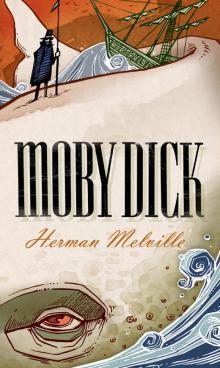 Moby Dick; Or, The Whale
Moby Dick; Or, The Whale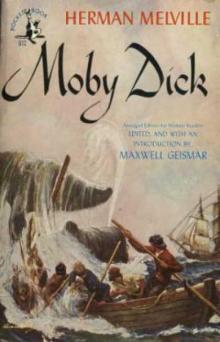 Moby Dick
Moby Dick Benito Cereno and Bartleby the Scrivener
Benito Cereno and Bartleby the Scrivener Israel Potter: His Fifty Years of Exile (Annotated Edition)
Israel Potter: His Fifty Years of Exile (Annotated Edition) Billy Budd and the Piazza Tales
Billy Budd and the Piazza Tales Billy Budd, Bartleby, and Other Stories
Billy Budd, Bartleby, and Other Stories Typee: A Romance of the South Seas
Typee: A Romance of the South Seas Omoo: Adventures in the South Seas
Omoo: Adventures in the South Seas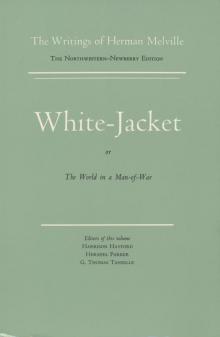 White Jacket; Or, The World on a Man-of-War
White Jacket; Or, The World on a Man-of-War Redburn. His First Voyage
Redburn. His First Voyage Mardi: and A Voyage Thither, Vol. II
Mardi: and A Voyage Thither, Vol. II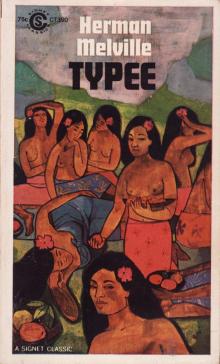 Typee
Typee The Paradise of Bachelors and the Tartarus of Maids
The Paradise of Bachelors and the Tartarus of Maids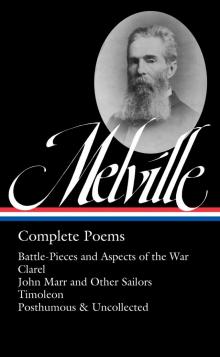 Herman Melville- Complete Poems
Herman Melville- Complete Poems Bartleby and Benito Cereno
Bartleby and Benito Cereno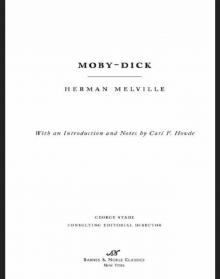 Moby-Dick (Barnes & Noble Classics Series)
Moby-Dick (Barnes & Noble Classics Series) Mardi and a Voyage Thither
Mardi and a Voyage Thither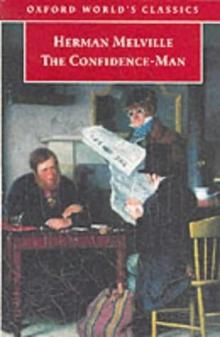 The Confidence-Man
The Confidence-Man Billy Budd and Other Stories
Billy Budd and Other Stories Bartleby the Scrivener
Bartleby the Scrivener Typee: A Romance of the South Sea
Typee: A Romance of the South Sea I and My Chimney
I and My Chimney Billy Budd
Billy Budd Pierre, Or the Ambiguities
Pierre, Or the Ambiguities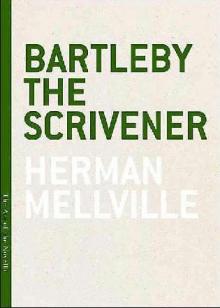 Bartleby, The Scrivener A Story of Wall-Street
Bartleby, The Scrivener A Story of Wall-Street Four Great American Classics
Four Great American Classics White Jacket or, The World on a Man-of-War
White Jacket or, The World on a Man-of-War The Piazza Tales
The Piazza Tales Israel Potter. Fifty Years of Exile
Israel Potter. Fifty Years of Exile